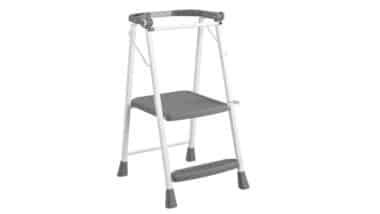![]() A Colorado couple filed a vaginal mesh lawsuit against Johnson & Johnson’s Ethicon unit after the wife experienced adverse side effects from Ethicon’s Gynecare Prolift mesh product.
A Colorado couple filed a vaginal mesh lawsuit against Johnson & Johnson’s Ethicon unit after the wife experienced adverse side effects from Ethicon’s Gynecare Prolift mesh product.
Judith and Jimmy Cordova filed their vaginal mesh lawsuit in November 2013 as part of the Ethicon pelvic systems products multidistrict litigation currently underway in the U.S. District Court for the Southern District of West Virginia in Charleston.
Mrs. Cordova had the Gynecare Prolift implanted on Aug. 12, 2008 at the Parkview Medical Center in Pueblo, Colorado.
The Johnson & Johnson Prolift device was introduced in March 2005 saying that it was an “innovative and effective surgical option” for those who had weakened pelvic muscles. However, it was not approved by the U.S. Food and Drug Administration until May 2008, when Johnson & Johnson sought approval for a similar product.
The medical products maker argued that it didn’t need approval because it was already selling a similar product — the Gynecare Gynemesh. But the FDA said the federal agency “disagreed with this assertion.”
In June 2012, Johnson & Johnson announced that it was stopping sales of its surgical mesh products including the Prolift device, although they said the decision was due to changes in the market not due to increasing reports of injury including death. The company said it was not a recall.
The Gyenecare Prolift is used to treat problems such as female stress urinary incontinence (SUI) and pelvic organ prolapse (POP). Stress urinary incontinence is the leaking of urine when there is a “stress event,” which can include coughing, sneezing, laughing or lifting–in other words, anything that puts pressure on the the abdomen. This occurs as the result of weakened pelvic muscles and connective tissue that support the bladder and urethra. There can be several causes of SUI including pregnancy, childbirth, menopause, obesity, smoking, and previous pelvic surgery. Over 15 million Americans suffer from SUI.
Pelvic organ prolapse develops in women due to child birth, a hysterectomy, or menopause. During childbirth the muscles and ligaments are stretched and can tear causing them to become too weak to hold the organs in place. As a result, the bottom of the uterus, the floor of the bladder, the rectum or all three can sag and even protrude into the vagina. Vaginal mesh slings are implanted to hold the organs in place where the muscles have failed.
The problem is that there have been several reports of adverse side effects linked to some of the products designed to solve incontinence and pelvic organ prolapse.
In three years, from 2006 to 2008, the U.S. Food and Drug Administration (FDA) received over 1,000 reports of vaginal mesh complications linked with surgical mesh devices to treat stress urinary incontinence as well as pelvic organ prolapse.
The side effects associated with urethral support systems and vaginal mesh implants include erosion through the vaginal epithelium, which is the tissue lining the inside of the vagina, infection, pain, urinary problems, and recurrence of the prolapse or incontinence problem as well as bowel, bladder and blood vessel perforation that can occur during the insertion of the mesh and and bladder sling products.
Treatment may include additional surgery, IV therapy, blood transfusions, and drainage of hematomas or abscesses that developed as the result of the faulty vaginal mesh or bladder sling products, and they can become quite costly.
The FDA issued a Safety Communication on July 13, 2011 saying that “serious complications associated with surgical mesh for transvaginal repair of POP are not rare.”
“Mesh contraction (shrinkage) is a previously unidentified risk of transvaginal POP repair with mesh that has been reported in the published scientific literature and in adverse event reports to the FDA,” the report continued. “Reports in the literature associated with mesh contraction with vaginal shortening, vaginal tightening and vaginal pain.”
The FDA concluded that “it is not clear that transvaginal POP repair with mesh is more effective than traditional non-mesh repair in all patients with POP and it may expose patients to greater risk.”
There have been a growing number of vaginal mesh and bladder sling lawsuits since the FDA’s 2011 report.
The Cordovas are charging Johnson & Johnson with negligence, manufacturing defect, failure to warn, defective product, design defect, common law fraud, fraudulent concealment, constructive fraud, negligent misrepresentation, negligent infliction of emotional distress, breach of express warranty, breach of implied warranty, violating consumer protection laws, gross negligence, unjust enrichment and loss of consortium.
The Cordovas’ Gynecare Prolift lawsuit has been added to the multidistrict litigation currently underway, In Re: Ethicon Inc., Pelvic Repair System Products Liability Litigation, MDL No. 2327, Case No. 2:13-cv-28409, in the U.S. District Court for the Southern District of West Virginia, Charleston Division.
If you or someone you know has had similar side effects or symptoms caused by a transvaginal mesh, bladder sling or vagina sling implant, legal options are available to you. Learn more and get a free legal consultation regarding a claim’s eligibility at the Vaginal Mesh Lawsuit and Vaginal Sling Class Action Lawsuit Investigation. Experienced legal professionals have access to medical experts to assess whether or not a vaginal mesh implant may be playing a role in your current pain, discomfort or other serious side effects, so act now.
ATTORNEY ADVERTISING
Top Class Actions is a Proud Member of the American Bar Association
LEGAL INFORMATION IS NOT LEGAL ADVICE
Top Class Actions Legal Statement
©2008 – 2025 Top Class Actions® LLC
Various Trademarks held by their respective owners
This website is not intended for viewing or usage by European Union citizens.














